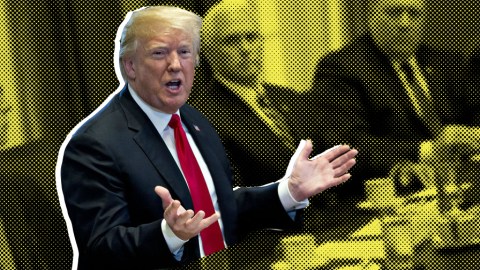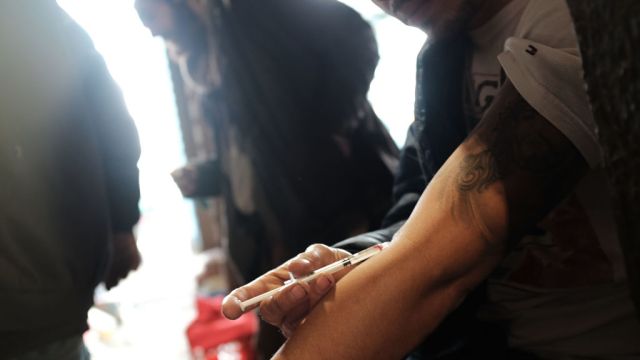Trump says he has the ‘absolute right’ to pardon himself. Does he?

President Donald Trump tweeted Monday that he has the ‘absolute right’ to pardon himself, a broad and controversial interpretation of presidential power that was asserted by his attorneys in a confidential letter sent to the special counsel in January.
As has been stated by numerous legal scholars, I have the absolute right to PARDON myself, but why would I do that when I have done nothing wrong? In the meantime, the never ending Witch Hunt, led by 13 very Angry and Conflicted Democrats (& others) continues into the mid-terms!
— Donald J. Trump (@realDonaldTrump) June 4, 2018
The president’s position likely stems from the aggressive legal posturing his attorneys took in a 20-page letter that was delivered to special counsel Robert S. Mueller III earlier this year, which was published Saturday by The New York Times. The letter states the president couldn’t have illegally obstructed the Russia investigation because he has the power to “if he wished, terminate the inquiry, or even exercise his power to pardon.”
But can the president actually pardon himself?
In short: It’s possible but unlikely. It could also lead to impeachment.
The Constitution states in Article II, Section 2, Clause 1 that the president has the “Power to grant Reprieves and Pardons for Offenses against the United States, except in Cases of Impeachment.”
However, there’s no direct mention of self-pardons.
“As such, arguments derived from the intent of the Framers are speculative at best,” legal scholar Brian C. Kalt told Constitution Daily. “There are two likely possibilities: Self-pardons either were not considered, or their invalidity was silently presumed. A third possibility, that self-pardons were presumed valid, is less likely.”
In his 1997 legal paper titled 'Pardon Me: The Constitutional Case Against Presidential Self-Pardons', Kalt argues that the two limitations stated in the pardon clause of the Constitution are crucial to the question of self-pardons.
“By limiting pardons to ‘Offences against the United States,’ the Constitution means to place private civil and state criminal cases beyond the President's reach. By excepting ‘Cases of Impeachment,’ the Constitution stays the President’s hand when Congress is doing the prosecuting instead of the executive branch. The President cannot stop the House from impeaching a federal official, nor can he undo the punishment the Senate doles out upon conviction.”
That last provision doesn’t make sense if the president could pardon himself, according to Laurence H. Tribe, Norman Eisen, and Richard Painter, all of whom are attorneys who have served on ethics committees for past White House administrations.
(Photo: Getty Images)
In a 2017 article published in The Washington Post, they describe how a U.S. president who issues a pardon is acting as a kind of “super judge” who wields the extraordinary power to decide on other people’s cases—not his own.
“He is not making a decision about himself,” they wrote.
Eisen, Tribe, and Painter asserted that the foundational case for this legal outlook, in the Anglo-American legal tradition, is a 17th-century lawsuit commonly called Dr. Bonham’s Case, in which a court ruled that one “cannot be Judge and attorney for any of the parties.” The West seems to have abided by that legal tradition de facto throughout recent history.
“We know of not a single instance of a self-pardon having been recognized as legitimate,” they wrote. “Even the pope does not pardon himself. On March 28, 2014, in St. Peter’s Basilica, Pope Francis publicly kneeled before a priest and confessed his sins for about three minutes.”
Of course, one reason there’s no historical examples of a sovereign power issuing a self-pardon in, say, England, the country from which the U.S. derives its legal foundation, is because kings were considered to be above the law. However, the themes of the Constitution and the fact that the U.S. has a trifurcated government suggest the framers didn’t intend to entrust the chief executive with the absolute power of a king.
The closest the country has come to finding out for sure came in the wake of President Richard M. Nixon’s Watergate scandal. Nixon’s attorneys, like Trump’s, reportedly told the former president that he had the power to issue himself a self-pardon, but Nixon refused to do so and was later granted a pardon by President Gerald Ford.
In 1974, Acting Assistant Attorney General Mary C. Lawton wrote a memo issued by the Justice Department Office of Legal Council explaining: “Under the fundamental rule that no one may be a judge in his own case, the President cannot pardon himself."
Still, some legal experts assert it’s an open question. What does seem absolute, however, is that the president would be impeached following a self-pardon. Even Trump’s chief lawyer, former New York City mayor Rudolph W. Giuliani, agrees.
In an appearance on NBC’s Meet the Press, Giuliani said that while Trump has “no intention of pardoning himself,” he “probably does” have the power to do so, but that would be “unthinkable” and “would lead to probably an immediate impeachment.”
There does seem to be an interesting loophole a president could use to receive a pardon and remain in office.
“A different approach to the pardoning problem could be taken under Section 3 of the Twenty-Fifth Amendment. If the President declared that he was temporarily unable to perform the duties of his office, the Vice President would become Acting President and as such he could pardon the President. Thereafter the President could either resign or resume the duties of his office,” Lawton wrote in the 1974 memo.
The confidential letter that was published Saturday also states that, as the nation’s chief law enforcement officer, obstructing the Russia investigation “would amount to him obstructing himself.” The letter also states that Trump is under no obligation to be interviewed by Mueller.
Trump tweeted Monday that the Russia probe is “UNCONSTITUTIONAL,” adding that he’s “done nothing wrong!”





